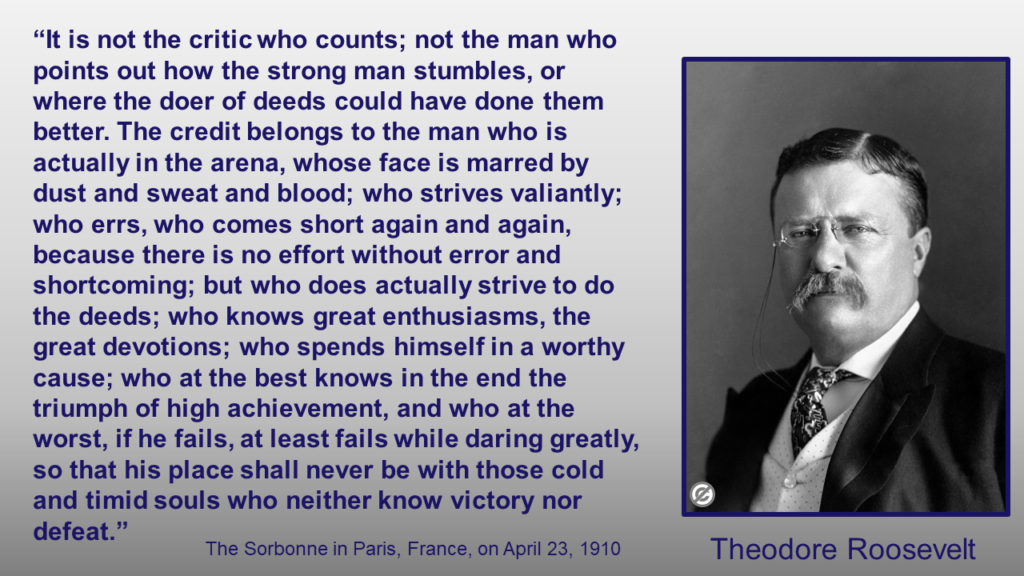Introduction
Theodore Roosevelt was born in New York in 1858, to a wealthy family but was plagued by ill-health, suffering from severe asthma. A very inauspicious start for a man who would achieve great things during his life.
Due to his frailty, he was home schooled and became an avid reader. His father impressed with his academic abilities cautioned him that in order to get the most out of his mind he would also need to develop the physical prowess to match. The young Theodore took this advice to heart and embarked on a program to overcome his frailties and develop a body to match his mind.
This led to him becoming a man of many talents.
I do not intend to present a detailed biography, but if you are interested in learning more details there are several books listed in the bibliography.
A Man for all Seasons
He became a professional author whilst still and undergraduate at Harvard1, and almost became a professional naturalist. He was however drawn to politics, serving in several roles in his native New York, before moving to the national stage.
He was a rancher, frontiersman, soldier, big game hunter and sportsman, amateur naturalist, conservationist, explorer and patriot.
Throughout his life he remained an avid reader and a prolific author, publishing over 40 books and countless articles.
Despite all this he also found time to be the 26th President of the United States and win the 1906 Nobel Peace Prize.2
Habits
How did he achieve so much?
He introduced and developed productive habits and rigorously improved both his mind and body, until the sickly boy was replaced by the strong and independent man.
He was an exponent of effort and striving, which in later life he would extoll in his man in the arena speech in Paris.3

Brené Brown’s book, on vulnerability and leadership, “Daring Greatly” takes its title from the speech.
There was the element of the showman and glory seeker in Roosevelt, but he was also willing to take the risk and “get in the arena”. He believed everyone should serve and in the words of one of his successors, “…do the other things, not because they are easy, but because they are hard”4
An incident on the 14th of October 1912 typifies Roosevelt, whilst campaigning for a third term, he was shot by an assassin as he was about to speak to a rally. Disregarding advice to go to the hospital, he insisted on speaking, and delivered a 90-minute oration.
Roosevelt served in Cuba during the Spanish American war and attempted to raise a volunteer unit to serve in WWI. His four sons served with American forces during WWI, his youngest Quentin, an aviator, was killed in action, and Theodore Jr. and Archie were seriously wounded.
Work like Teddy Roosevelt5
Cal Newport in his book Deep Work6 devotes a section to Roosevelt and his rigorous use of the calendar to ensure that the important, and long-term tasks are completed and not lost in the clutter of minutia, or the hustle and bustle of everyday life.
Newport explains how undergraduate Roosevelt would plan his day assigning the major tasks for the day, classes, athletic practice , etc. These left small periods of time available for study and other intellectual pursuits. During each period Roosevelt devoted himself intensely to the assigned task until that period was completed.
Using these techniques, during his freshman year, he was able to maintain good grades and produce his first professional publication, “The Summer Birds of the Adirondacks”. In his book Newport discusses the various tools and techniques to help you develop similar skills, and why it is important.
Atomic Habits
Although not related to or referencing Roosevelt, James Clear’s book Atomic Habits also provides a guide to the development of habits that can help lead to a productive and fulfilling life.
By making small incremental improvements, which compounded can produce outstanding results.
The book is built around four laws for developing good habits and stopping bad ones.
- Law #1 Make it Obvious.
- Law #2 Make it Attractive.
- Law #3 Make it Easy.
- Law #4 Make it Satisfying.
With a little work and dedication maybe, there is a Teddy within you.
Conclusion
Theodore Roosevelt’s life embraced many dichotomies.
He at times appeared a war monger and at another was the winner of the Noble Peace Prize.
A conservationist, we owe many of the national monuments to him, but an avid hunter of big game.
He was instrumental in the final development of the Panama Canal. (More of that in a later post)
One of his slogans was, “A square deal for every man”, and although he may not have succeeded in every case he did strive for fairness.
But, whatever he did he did with passion and was able to achieve much during his relatively short life, he died a few months after his 60th birthday, having dared greatly.
Top Lesson for Project Managers
As project managers there is much we can learn from Teddy:
- Always continue to study and learn.
- Cultivate habits that allow you to excel at your work and other aspects of your life.
- Focus on the Deep Work, and do not get lost in the hurly-burly of project life.
- Share your knowledge, write/speak.
- Strive to give a square deal to everyone you encounter.
- Dare Greatly
NOTES
1Summer Birds of the Adirondacks – 1877.
2For his mediation in bringing to an end the Russo-Japanese War.
3Delivered at the Sorbonne on April 23, 1910, titled “Citizenship in a Republic”
4President Kennedy’s “go to the moon speech at Rice University 12th September 1962, officially titled; “ Address at Rice University on the Nation’s Space Effort”
5Deep Work by Call Newport Page 166
6Deep Work is the ability to focus without distraction on a cognitively demanding task. – Cal Newport
BIBLIOGRAPHY
- The Rise of Theodore Roosevelt – Edmund Morris
- Theodore Rex – Edmund Morris
- Colonel Roosevelt – Edmund Morris
- Teddy Roosevelt – Captivating History (Kindle)
- Deep Work – Cal Newport
- Atomic Habits – James Clear
- Daring Greatly – Brené Brown

No one connects history and PM like this. : ). Well done
This is a great story. I love that Teddy Roosevelt was an outdoorsman – there are beautiful little cabins named after him in Yellowstone National Park where he enjoyed visiting.
I also love that you link in Cal Newport’s Deep Work. This is a favorite book of mine and I can see (now) that Teddy Roosevelt had the deep focus Newport discusses.
Thanks for sharing your passion for history and project management!